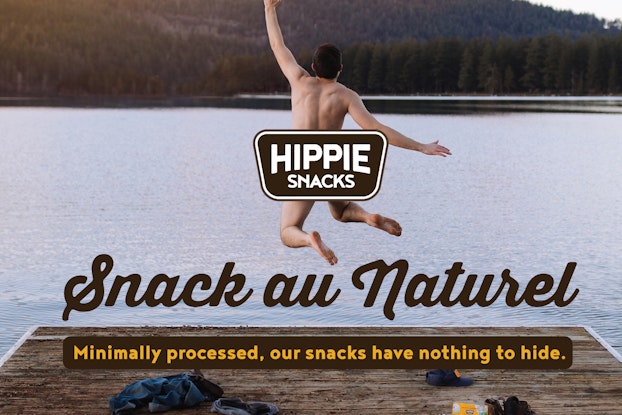
Ian Walker, founder and president of Canadian brand Hippie Snacks, is making his second move to conquer the healthy snacks market in the United States. This time, he told CO—, he has learned from his past mistakes.
Walker was the 20-something co-owner of an organic nut butter and natural foods company, Skeet and Ike’s, in Western Canada in the late 1990s. Grocery stores throughout the United States were eager for his products, and Walker thought U.S. expansion would be easy.
But Skeet and Ike’s didn’t have the scale, the profit margins or the distribution infrastructure to be profitable in the U.S. market, no matter how much they sold.
“We really did everything the wrong way, every possible way,” he said. He left the U.S. market and refocused on Canadian stores.
“I promised myself I wouldn’t go back into the U.S. until I could stand on my own two feet and we had some products that really stood out in the market,” he said.
Fast-forward to 2020: Skeet & Ike’s has evolved into a brand with a new name, Hippie Snacks, and a new focus on the better-for-you snack category.
The brand’s signature product is snack crisps – a cross between a cracker and a chip – made out of whole foods like coconut, cauliflower, avocado or almonds, with minimal processing and without artificial ingredients.
It is now making a slow-and-steady march into supermarket aisles in the United States.
Hippie Snacks began entering the U.S. market two years ago, starting on the West Coast. It is now expanding into the rest of the country and moving into national chains like Safeway and Albertsons, as well as regional grocers like Wegmans. The U.S. expansion, along with increased demand for healthier snacks and natural foods, has helped Hippie Snacks double its sales over the past two years, with close to $10 million expected this year.
We were the weirdos, and now we’re kind of cool. The market has come to us.
Ian Walker, founder and president, Hippie Snacks
Once ‘the weirdos,’ now ‘the market has come to us’
Twenty years ago, Walker said, organic and natural food products were unconventional. Now they are mainstream.
“We were the weirdos, and now we’re kind of cool,” he said. “The market has come to us.”
Numerous studies document Americans’ growing appetite for natural foods and healthier snack options.
Market research firm The NPD Group reported that snacks that promise health-and-wellness benefits are a growing trend in the snack category.
That demand is expected to grow as Gen Z consumers — the generation born after 1997 — become a bigger percentage of the grocery shopping population, according to NPD.
But it’s not just Gen Z that’s hankering for healthful snacks. Bites with perceived “wellbeing benefits” have become an “ingredient phenomenon,” from natural and organic, non-GMO and high-fiber fare to collagen-infused snacks designed to support hair, skin and joint health, according to a report from market research firm IRI.
Indeed, “getting nutrients continues to be important to the majority of consumers,” the IRI report found, with 54% of shoppers between the ages of 18 and 54 seeking out snacks that contain vitamins and minerals.

Tripling manufacturing capacity to meet increased demand
Hippie Snacks manufactures all of its products in its own facility in Burnaby, British Columbia. The company, which also does contract manufacturing for other brands, is preparing to triple the capacity of its manufacturing facility to meet increased demand.
Back in the Skeet and Ike’s days, Walker created a distribution company, Left Coast Naturals, which distributes natural and organic foods to stores throughout Canada.
Having that distribution background gave the Hippie Snacks teams insight into how best to approach the U.S. market. Its first U.S. placement was in Starbuckscoffee shops, after success in Starbucks locations in Canada. It is sold at Whole Foods stores in the Pacific Northwest states, Sprouts markets on the West Coast, select Safeway and Albertson stores, and this year East Coast-based supermarket chain Wegmans also began selling the snacks.
The brand has been sold on the Thrive Market online marketplace for close to two years, and on Amazon for the past year.

A brand-making eureka moment: ‘Why do they have to be the same?’
As Hippie Snacks was evolving into the brand it is today, a pivotal moment occurred when the team was talking to a store about why a particular tortilla chip wasn’t selling. The store management’s reply was, “Well, every tortilla chip’s kind of the same,” Walker recalled.
“A lightbulb went off,” he said. “Why do they have to be the same? Why can’t we make tortilla chips from other things that are more nutrient dense and that actually give you added value from a nutrition standpoint?”
“Our strength is trying to create new subcategories and make products that have ingredients that haven’t been done before,” Walker said. “That’s our way of trying to stand out in a crowded marketplace.”
Walker believes that Hippie Snacks has two compelling brand messages that help it stand out in the increasingly crowded natural foods market.
First, consumers want minimally processed foods. “Our cauliflower crisps are made from whole cauliflower. We actually grind it ourselves,” without fillers or additives, he said.
Second, Hippie Snacks emphasizes that the vegetable the crisp is named after is always the first, or primary, ingredient in the product. The packaging highlights that cauliflower is the first ingredient in its cauliflower crisps, avocado is the first in the avocado crisps and so on.
“There’s a lot of tokenism, where something is called a bean chip or an almond chip, but those are like the eighth ingredient listed,” Walker said. “It resonates with consumers that when we say it’s a cauliflower crisp that it’s actually made from cauliflower. It’s something we can talk about, and customers get it,” he said.
In addition to its geographic expansion, Hippie Snacks is planning to expand its offerings over the coming year to include new bean and plant-based crisps, and a sweet and savory option.
Before it began expanding in the United States, it conducted market research to learn what U.S. consumers were looking for in better-for-you snacks.
“We wanted to be sure we weren’t running fast in the wrong direction, or telling the wrong message to consumers,” he said.
-Barbara Thau contributed to this story.
CO— aims to bring you inspiration from leading respected experts. However, before making any business decision, you should consult a professional who can advise you based on your individual situation.
Follow us on Instagram for more expert tips & business owners stories.
CO—is committed to helping you start, run and grow your small business. Learn more about the benefits of small business membership in the U.S. Chamber of Commerce, here.
CO— Exclusives: Insider Strategies
How the buzziest brands and hottest startups are solving today's biggest business challenges. CO— brings you advice from startup founders and top executives for thriving in a new world.








